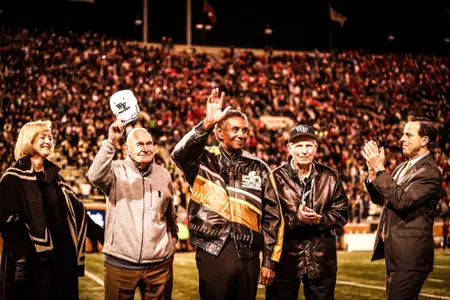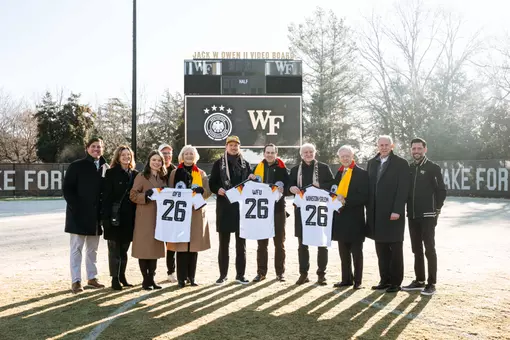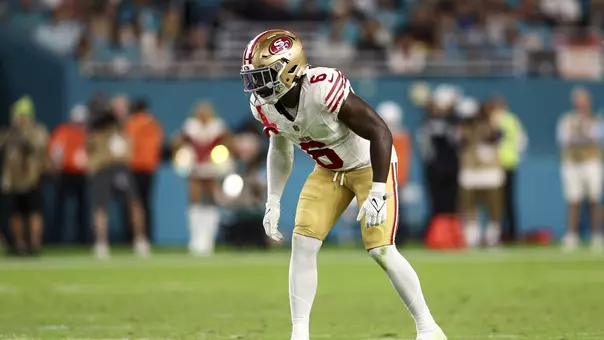
Culture Setter: Coach Bill Tate Embraced Opportunities for Black Student-Athletes at Wake Forest
7/30/2021 8:00:00 AM | Football, General
President Harold Tribble, AD Gene Hooks and head coach Bill Tate were committed to Wake Forest becoming the first school to integrate intercollegiate athletics in the south and they supported the student-athletes and each other.
WINSTON-SALEM, N.C. -- The path to change started with a single conversation.
Wake Forest University President Harold Tribble summoned football coach Bill Tate to his office for a conversation that led to Wake Forest Athletics becoming standard bearers in the south for racial integration.
"Dr. Tribble one day in February of 1964 called and said he wanted to talk to me," Tate said. "I walked over to his office for a chat. He asked me what I thought about recruiting Black athletes and I told him I was all for it."
The concept of integrating the Wake Forest Football team in the mid-1960's was fraught with peril. On one hand, administrators had to help ensure the prospective student-athletes would get admitted and accepted both on the field and in the classroom, while at the same time Tate had to convince them they would be welcomed and have a chance to excel.
"Recruiting is an everlasting enigma," Tate said. "There were many Black prospects fearful of going to a predominately white institution at the time, and understandably so. They did not know how they would be accepted. Not everybody was in tune with the decision we made."
Tate, who coached the Demon Deacons from 1964-68, found success right away as he brought in defensive lineman Bob Grant and wide receiver Butch Henry in the fall of 1964 as two of the first Black student-athletes at Wake Forest.
"Butch Henry and Bob Grant were the first two Black football players we recruited," Tate said. "Butch's parents were educators. Bob arrived at Wake Forest with a Black Belt and was very capable physically. They both did well academically at Wake Forest."
Tate appealed to their sense of history, while also being honest with both Henry and Grant about the circumstances they were likely to face, especially on the road in the south.
"I told both of them that we intended to integrate Wake Forest with Black athletes," Tate said. "I told them it would help open up recruiting in the South, and it did. I told them they had to be prepared, because there were still discrimination and people were going to say things they will not want to hear.
"They had to be strong and let that roll off their back. These are kids who had to put up with that. That is why young men like Bob Grant, Butch Henry and Jimmy Johnson — they put up with a lot of things Black kids don't have to put up with today."
Grant was an imposing physical specimen, and outstanding college football player — eventually selected with the 50th pick of the 1968 NFL Draft to the Baltimore Colts. He played in two Super Bowls, claiming a championship in a Baltimore 16-13 win over the Dallas Cowboys in Super Bowl V.
"Bob was so good, we named a defense after him," Tate said. "We called it 60 Grant. Whenever we called that defense, that meant he could play any position he wanted to play and go get the quarterback. And that is what he did. It was actually a pretty good defense for us, because it turned him loose to go after the offensive linemen and get to the quarterback."
The decision to integrate intercollegiate athletics at Wake Forest led to threatening letters directed at Coach Tate from members of the Ku Klux Klan.
"I didn't keep any of them," Tate said. "I threw them away in the garbage and never thought about them again.
"Playing down south was difficult, because we could not go to some restaurants or movie theaters with Butch and Bob. So, we had to eat in the hotel and had to take our own movies and show them at the hotel. It was difficult, but we got through it."
The relationship Grant built with Tribble was instrumental to his success at Wake Forest.
"Dr. Tribble was a big help to Bob and Butch," Tate said. "Butch's family was just 25 minutes away. Bob was further away and did not have a car to go home. He needed Dr. Tribble and me to help keep his head up and focused on football and academics."
Grant gives much of the credit for the integration of Wake Forest Athletics to Tate, Tribble, and athletic director Gene Hooks.
"Can you imagine the courage it took for Dr. Tribble, the president of the school at that time, along with Gene Hooks, who was the new athletics director, with Coach Bill Tate, in the South?" he asked. "You never even hear their names associated with it but look at what they did."
Wake Forest University President Harold Tribble summoned football coach Bill Tate to his office for a conversation that led to Wake Forest Athletics becoming standard bearers in the south for racial integration.
"Dr. Tribble one day in February of 1964 called and said he wanted to talk to me," Tate said. "I walked over to his office for a chat. He asked me what I thought about recruiting Black athletes and I told him I was all for it."
The concept of integrating the Wake Forest Football team in the mid-1960's was fraught with peril. On one hand, administrators had to help ensure the prospective student-athletes would get admitted and accepted both on the field and in the classroom, while at the same time Tate had to convince them they would be welcomed and have a chance to excel.
"Recruiting is an everlasting enigma," Tate said. "There were many Black prospects fearful of going to a predominately white institution at the time, and understandably so. They did not know how they would be accepted. Not everybody was in tune with the decision we made."
Tate, who coached the Demon Deacons from 1964-68, found success right away as he brought in defensive lineman Bob Grant and wide receiver Butch Henry in the fall of 1964 as two of the first Black student-athletes at Wake Forest.
"Butch Henry and Bob Grant were the first two Black football players we recruited," Tate said. "Butch's parents were educators. Bob arrived at Wake Forest with a Black Belt and was very capable physically. They both did well academically at Wake Forest."
Tate appealed to their sense of history, while also being honest with both Henry and Grant about the circumstances they were likely to face, especially on the road in the south.
"I told both of them that we intended to integrate Wake Forest with Black athletes," Tate said. "I told them it would help open up recruiting in the South, and it did. I told them they had to be prepared, because there were still discrimination and people were going to say things they will not want to hear.
"They had to be strong and let that roll off their back. These are kids who had to put up with that. That is why young men like Bob Grant, Butch Henry and Jimmy Johnson — they put up with a lot of things Black kids don't have to put up with today."
Grant was an imposing physical specimen, and outstanding college football player — eventually selected with the 50th pick of the 1968 NFL Draft to the Baltimore Colts. He played in two Super Bowls, claiming a championship in a Baltimore 16-13 win over the Dallas Cowboys in Super Bowl V.
"Bob was so good, we named a defense after him," Tate said. "We called it 60 Grant. Whenever we called that defense, that meant he could play any position he wanted to play and go get the quarterback. And that is what he did. It was actually a pretty good defense for us, because it turned him loose to go after the offensive linemen and get to the quarterback."
The decision to integrate intercollegiate athletics at Wake Forest led to threatening letters directed at Coach Tate from members of the Ku Klux Klan.
"I didn't keep any of them," Tate said. "I threw them away in the garbage and never thought about them again.
"Playing down south was difficult, because we could not go to some restaurants or movie theaters with Butch and Bob. So, we had to eat in the hotel and had to take our own movies and show them at the hotel. It was difficult, but we got through it."
The relationship Grant built with Tribble was instrumental to his success at Wake Forest.
"Dr. Tribble was a big help to Bob and Butch," Tate said. "Butch's family was just 25 minutes away. Bob was further away and did not have a car to go home. He needed Dr. Tribble and me to help keep his head up and focused on football and academics."
Grant gives much of the credit for the integration of Wake Forest Athletics to Tate, Tribble, and athletic director Gene Hooks.
"Can you imagine the courage it took for Dr. Tribble, the president of the school at that time, along with Gene Hooks, who was the new athletics director, with Coach Bill Tate, in the South?" he asked. "You never even hear their names associated with it but look at what they did."
Wake Forest vs Mississippi State | Duke's Mayo Bowl Cinematic Recap
Friday, January 09
Steve Forbes - Postgame Presser vs. Miami
Thursday, January 08
Steve Forbes - Postgame Presser vs. Virginia Tech
Saturday, January 03
Head Coach Jake Dickert Duke's Mayo Bowl Postgame Press Conference (Jan. 2, 2026)
Saturday, January 03
.jpg&height=340&type=webp)


